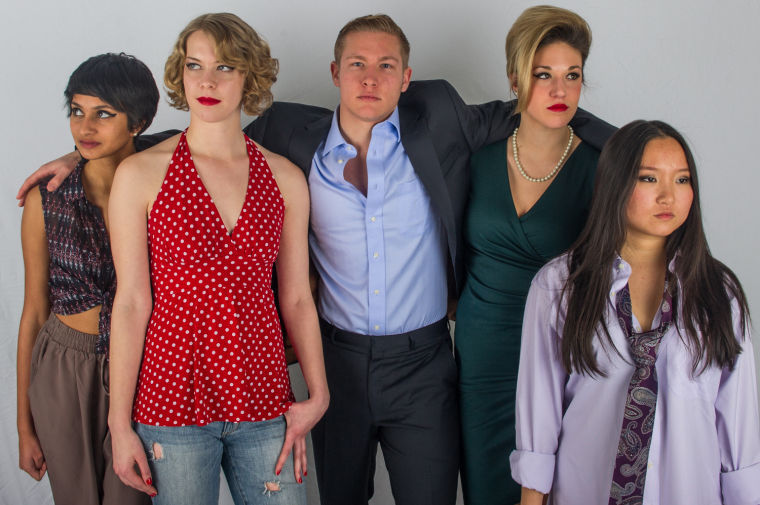In search of a soulmate: Romance at Pitt in the 1960’s
February 13, 2014
Two indelible events frame Jim O’Brien’s time at Pitt.
“In 1960, Bill Mazeroski hit the greatest home run ever, ending game seven of the World Series with the New York Yankees,” said O’Brien, 71, who was then a freshman. “And in November of ’63, [John] Kennedy was killed.”
A third event, however, tops them both: the night he met his wife.
Most students have seen the glass-encased home plate on the first floor of Posvar Hall where Forbes Field once stood. For the class of 1964, that home plate is a reminder of the Oakland that they knew during their years at Pitt.
That was a time when Forbes Field resounded with the cheers of the crowd, trolley cars rushed commuter students along Forbes Avenue and musicians such as Solomon Burke and Dionne Warwick played at the Syria Mosque, a music venue on Bigelow Boulevard and Ruskin Avenue that that was eventually replaced with a parking lot. Martin Luther King Jr. was touring the country, the Vietnam War draft had begun and many Pitt students were searching for their life partners amid this social change.
“At Pitt, girls and guys were looking to find their mate,” said Marilyn Dikkers, 70, of Paris, France, who graduated from Pitt in 1965 with degrees in journalism and German.
Dikkers said that it was common for students to be engaged by senior year and to get married the year after graduation. In her case, a friend introduced Dikkers, then named Trapani, to a graduate student from Paris named Mel Dikkers. She met him in the Tuck Shop, a restaurant that was located in the basement of the Cathedral of Learning.
“He asked me immediately if I was doing anything after dinner,” Dikkers said, adding that she was charmed by his accent and his rather rudimentary English. She said that Mel had access to more campus facilities than undergrads because he was a foreign graduate student and that they would often spend time in an unoccupied music room.
“He would play the piano,” Dikkers said. “And it was a great opportunity for us to be alone and get to know each other.”
O’Brien, who lives in Pittsburgh, graduated in 1964 with a degree in writing and went on to write 25 books, including his most recent, “Chuck Noll: a Winning Way.” He met his wife, Kathleen Churchman, at a party for The Pitt News staff.
“A lot of guys and gals met their mates on The Pitt News staff,” said O’Brien, who wrote for The Pitt News, though he added that many guys, especially those in search of intelligent women, would search for their soul mates at the library.
Jim Grossman graduated from Pitt in 1964 and knew O’Brien from their days at Taylor Allderdice High School in Pittsburgh. According to Grossman, 71, who now lives in New York City, the Tuck Shop was the pinnacle of the Pitt social scene during the daytime. Fraternities and other groups would set up booths, and students often fell into cliques there, with rival factions forming based upon where a student was from.
“Pitt in the early ’60s was in a transition from being a commuter school,” Grossman said, adding that this led to some tension and that the rivalry between students from Pittsburgh and those from Long Island, N.Y., caused him to quit pledging a fraternity, though he declined to say which one.
According to Grossman, who graduated from Pitt in 1964 with a bachelor’s degree in political sience, the sexual and social revolution that he would witness during graduate school at Columbia hadn’t quite happened yet.
“The social norms were more traditional in the early ’60s,” Grossman said. To illustrate his point, he recalled an evening when he, a friend and their dates attended a fraternity party at which a comedian was performing. According to Grossman, the comedian shocked the crowd by using “the ‘F’ curse.”
“We were appalled, because that was totally unacceptable at the time,” Grossman said, adding that perhaps he and his friends had used that word on rare occasion but would never use it among women.
“It was so offensive, we went out and had a discussion about it,” Grossman said.
Marilyn Dikkers agreed that 1964 was still a very culturally conservative time, something that she didn’t notice until she moved to Paris after she and Mel Dikkers graduated. She pointed out that, in keeping with her values, she lived in an apartment of her own in Paris until she and Mel got married.
“It all started at Pitt,” Dikkers said, after observing that all three of her best friends also went on to marry their Pitt boyfriends. “Some of the friends I met in Pittsburgh were truly deep and lifelong friends.”



